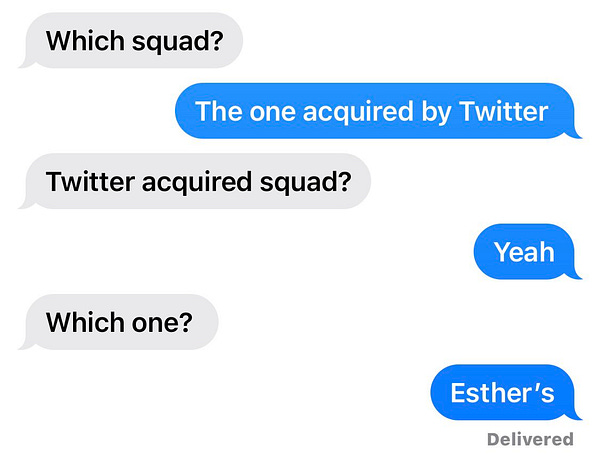Hi y’all, Cokie here.
Been a while, eh? Don’t worry, I’ll catch you up. I’ve been in the same leggings for three days, I just finished my 12th straight hour of calls, and Ariana Grande is releasing a documentary on Netflix on December 21st, so obviously I’m emotional. I asked Ian and Julie to tell me what to write about (I hear that’s what editors are for) given that I’m a bit rusty.
Ian immediately asked: “Is there one BaaS winner, like a zero sum game, or is this an expanding pie and why?”
My response: “I answer that all gd day. I’m on it.”
First of all, how are we defining Banking as a Service? Here’s the differentiation I like to make: banks DO BaaS, infrastructure providers OFFER BaaS. Let me add some much needed nuance: in order to be a bank as a service, you have to be a bank. In order to offer a banking as a service solution, you do not need to be a bank, and thus, you are a BaaS/infrastructure provider (ie: Moov or Unit).
For the purposes of this article, I intend to focus on BaaS/infrastructure providers. There will not under any circumstance be one BaaS winner -- there are just too many things going on. Some players specialize in lending, some in deposits, some in small business, and others brokerage. The amount of unbundling and re-bundling we would have to do to get one player to rule them all is terrifying. I don’t think any of us would survive tech twitter throughout that process. And actually, not having one winner is incredibly important for both the integrity of these projects and market stability (RIP Wirecard).
The entire point of the BaaS movement (or am I required to say Moovment at this point?) was to change the mentality of how we think about delivering financial services through first principles thinking, API and developer-first execution, and, most importantly, partnerships strategy. Banks have traditionally been vertically integrated, which is to say that they build and deliver every single thing that they do themselves. Doesn’t that seem absolutely wild to you? No other business runs this way in the 21st century. The infrastructure providers offer an alternative in horizontal integration, which is to say that they partner with “as a service vendors” all the way down the stack to satisfy the needs of what a bank needs to run. An example, if you will: Alloy provides KYC and ID&V solutions through a single API touchpoint. To make things a little more digestible, here’s an analogy that I like to use.
Imagine for a moment that you are planning to put a really lovely bench in your backyard. You want this bench to be the shining beacon of your backyard accoutrements, but you don’t know how to build one yourself. Who would you rather enlist to build it for you?:
The master craftsman, who has been doing this for 40 years, or
Your neighbor, who happens to have trees in their backyard?
I’ll give you a moment.
The answer is clearly the master craftsman. Your neighbor has wood and maybe even a saw and some nails or whatever, but they don’t know how to put the pieces together to make the bench. Same thing in financial services. “As a service vendors,” like Alloy, are the master craftsmen, banks have all the tools but can’t quite get it right. In order for us to get BaaS right, we need to work with the master craftspeople all the way down the stack and therefore, one winner is unlikely at best.
As the technology evolves, partnerships will continue to become more and more vital to unify the new financial system. Infrastructure providers will partner with each other to expand their offerings, “as a service vendors” will continue to provide the B2B products required for these ventures to run, and banks themselves will continue to loan out their charter.
@ me on Twitter if you have questions. If there’s interest, I’ll happily go into my prediction for community banks next week. In the meantime, Ian & Julie, I hope that answered your question.
In Sunday’s premium FTT, Julie has compiled a list of recommended books from Square’s CFO, Current’s Founder, Jackie Reses, Orum’s Founder, and many more. Def check it out so you can add these books to your list or buy one for someone else as a gift (‘tis the season).
The News by Julie VerHage and Parker Jay-Pachirat
Betterment CEO Jon Stein stepped down from his position on Tuesday. Julie here to write this one. Did you know the very first story I ever did on fintech was about robo-advisors? And it was Betterment that first got me interested in this space? Jon Stein was also my first keynote interview, and probably the CEO that has been kindest to me over the years when it comes to being honest and helpful (along with Alexa from LearnVest, Ken from Credit Karma, and Chris from Chime, to name a few from a list I can count on both hands). I honestly choked up a bit reading this story as well as his parting letter. Jon never got caught up in all of the tech hype that so many of us fall prey to. All he truly wanted to do was help people, and that’s exactly what he did. And for what it’s worth, I would be shocked if he was pushed out. Being CEO for 10 years is a LOT! Plus he’s passionate about spending time with the 2 kids he’s had during that time frame. I remember once I interviewed him and Alexa together, and backstage prior to our panel, the two couldn’t stop talking about their lovely families and how much they wished they could spend more time with them and be there for every big moment. That, essentially, sums up Jon and the kind of guy he is. It’s no wonder he’ll be missed.
The U.S Consumer Financial Protection Bureau issued an advisory opinion this Monday stating the earned wage access products do not represent extensions of credit. Parker here. Earned wage, also known as on-demand payroll access, is used by many companies to give workers access to pay before the scheduled payday. In the advisory opinion, the CFPB cited the Bureau of Labor, noting that nearly two-thirds of U.S. private businesses use biweekly, semimonthly, or monthly pay periods, but emphasized that the interval of time between hours worked and receiving a paycheck can contribute to employees’ financial distress. “This advisory opinion clarifies that a Covered EWA Program does not involve the offering or extension of ‘credit’” as the providers must provide funds to accounts of employee’s choice and must not charge fees for delivering those funds. The EWA must contract directly with employers to offer and provide covered EWA transactions to the employer’s employees. The Provider Account must allow the employee reasonable use of that account at no charge,” stated the CFPB.
The CFPB also sued LendUp Loans this week for violating the Military Lending Act with its extensions of credit. If you need a quick refresher, LendUp is a California-based online lending platform offering single-payment and installment loans to its customers. The Bureau’s complaint, filed in the United States District Court for the Northern District of California, seeks an injunction, as well as damages, redress to consumers, disgorgement of ill-gotten gains, and the imposition of civil money penalties. The action is part of a broader sweep of investigations the Bureau is conducting against lenders’ violation of the Military Lending Act.
Jack Ma’s Ant Group faces more scrutiny in China, as bank partners claim they became dependent on the platform for loan issuance but were left on their own to manage defaults with high-risk originations. In the span of one year, Ant Group originated loans to half a billion people in China, accounting for nearly one-fifth of China’s outstanding short-term consumer debt in June. People familiar with Ant’s microlending operations say regulators are concerned about the banks and trust companies who have supplied a significant amount of funds to Alipay users. According to these sources, Ant is exposing the Achilles’ heel of China’s financial system: weaker financial institutions with poor risk-management capabilities are becoming more dependent on the fintech giant to source loans, and are left holding the bag when defaults happen. In wake of claims made against Ant by banking partners, chairman of the China Banking and Insurance Regulatory Commission Guo Shuqing hinted on Tuesday that more fintech regulation is yet to come.
Challenger bank Rocketer is piloting Sweden’s first-ever biometric debit card.To pilot the card, Rocketer partnered with IDEMIA, the global leader in augmented identity technology. The debit card harnesses biometric technology to enhance security- storing all biometric credentials on the chip in the card rather than in a remote database. Rocketer hopes the card will make transactions faster, more hygienic, and more secure by removing necessary touchpoints in public places. IDEMIA’s F.CODE biometric payments card will undergo proof of concept with Rocketer’s customers during Q’1 of 2021.
Capital One deemed buy-now-pay-later credit card transactions as ‘risky’, banning customers using a Capital One card to use the service made popular by BNPL fintechs like Klarna, Affirm, and Afterpay. Capital One, hosting 62 million accounts with more in Canada and Britain, said they would no longer allow “transactions identified as point of sale loans charged on its credit cards, regardless of the point of sale lender.” The move makes Capital One the first major financial institution to push back against BNPL services. While some BNPL services allow users to pay with credit cards, the majority of transactions are done via debit and ACH.
Spain’s second-largest bank BBVA is set to launch crypto services, according to two people familiar with the matter. The Spanish bank will begin offering services like cryptocurrency trading and custody out of Switzerland, said a source. BBVA declined to comment.
Fundraising News by Parker Jay-Pachirat
Did someone say BaaS? On Tuesday, the third-party integrations platform Unit launched out of stealth with $18.5M in funding. Offering a platform that allows third parties to integrate banking-as-a-service features into their websites, Unit follows the footsteps of prominent companies like Stripe and Twilio. The round was led by Better Tomorrow Ventures, Aleph, Flourish Ventures, Operator Partners, and TLV Partners, as well as 30 angels- many of whom have experience in fintech. Unit says they will use this round to add new features, hire more people, and secure new users. FYI: FTT Founder Ian Kar invested in this round too…please consider this his disclosure :)
Fintech Synctera launched out of stealth mode on Tuesday with $12.4M in Seed funding. Synctera aims to facilitate scale for fintechs, encouraging banks to leverage their current capabilities in new ways by bringing regulatory compliance to fintechs and enhancing backend operation for legacy banks. “We’re working with community banks that previously either hadn't been able to participate in the FinTech revolution or are doing it, but aren't doing it as efficiently as they would like,” said Synctera CEO Peter Hazlehurst. “We’re helping them build all of the things they would need to do to run effective FinTech programs.” The $12.4M seed was led by a consortium of investors under Lightspeed, alongside notable angel investors including Zachary Perret, CEO of Plaid, and Max Levchin, founder and general partner at SciFi VC.
German fintech Solactive took a $60.4M growth investment from Summit Partners on Tuesday. Solactive provides technology-enabled indices and personalized index solutions to the global financial services industry and is widely regarded as a disruptor in the global indexing space. Currently, Solactive has over 400 clients worldwide including major investment banks, ETF providers, and hedge funds, with more than $200B of global assets linked to over 17,000 Solactive indices.
Swedish fintech Tink raised $103M in funding today as its open banking platform grows to 250M customers and 3,400 banks. Tink provides infrastructure and data products- aggregating banks and financial services through an API and allowing them to be accessed through new channels. Partners of Tink include PayPal, NatWest, ABN AMRO, BNP Paribas, and Nordea and SEB, some of whom are also strategic investors. This latest round was co-led by investor Eurazeo Growth and Dawn Capital. Other participants included PayPal Ventures, HMI Capital, Heartcore, ABN AMRO Ventures, Poste Italiane and BNP Paribas’ venture arm, and Opera Tech Ventures.
Mexican neobank Albo raised $45M this week. The neobank, which offers customers a digital account and financial management app in addition to a prepaid Mastercard for receiving, transferring, and spending money, will use this raise to expand into lending and insurance. Albo has already claimed 500,000 customers- which is 40% of the Mexican digital banking market, according to data from Apptopia. In expanding their services, Albo hopes to increase financial autonomy in a country where around half the population doesn’t have access to a bank account.








